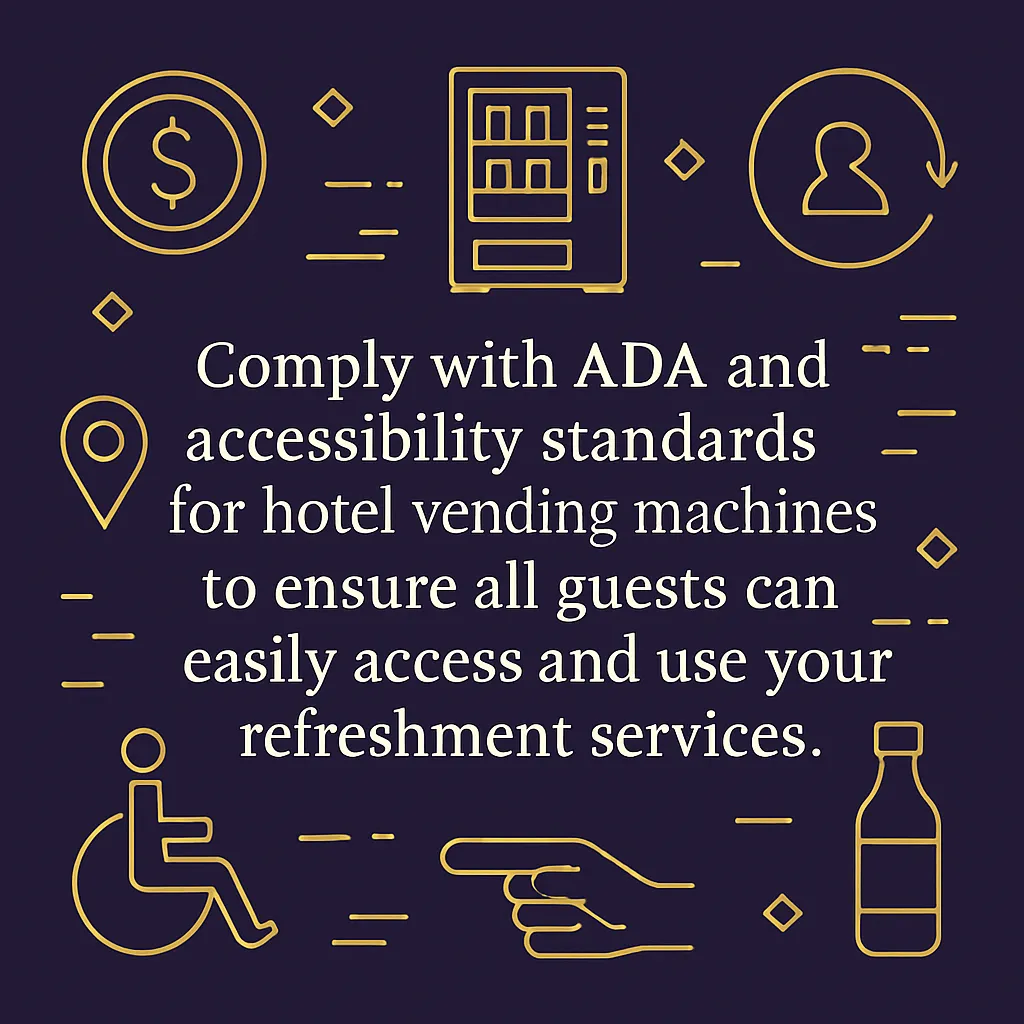Accessibility Standards for Hotel Vending Machines
Comply with ADA and accessibility standards for hotel vending machines to ensure all guests can easily access and use your refreshment services.
Back to Vending for Hotels ResourcesComply with ADA and accessibility standards for hotel vending machines to ensure all guests can easily access and use your refreshment services.
Back to Vending for Hotels ResourcesProviding accessible vending machines is more than a legal requirement; it's a commitment to guest satisfaction. Hotels can enhance their service by ensuring all guests, regardless of ability, can easily use their vending options.
![]() Guaranteeing equal access for all hotel guests
Guaranteeing equal access for all hotel guests
![]() Ensuring comfortable and convenient use for wheelchair users
Ensuring comfortable and convenient use for wheelchair users
![]() Upholding legal compliance and enhancing guest experience
Upholding legal compliance and enhancing guest experience

In the hospitality industry, providing an inclusive experience for all guests is paramount. This extends to every amenity, including vending machines. Adhering to accessibility standards, particularly those set forth by the Americans with Disabilities Act (ADA), ensures that hotel vending machines are not just available, but truly usable by individuals with diverse needs.
ADA guidelines specify critical dimensions and operational features for accessible vending machines. These often include maximum reach ranges for operating mechanisms and coin slots (typically no higher than 48 inches for a front approach, or 54 inches for a side reach). There must also be a clear floor space of at least 30 by 48 inches in front of the machine, allowing adequate room for a wheelchair to maneuver. Buttons and controls should be operable with one hand and not require tight grasping, pinching, or twisting of the wrist. Ensuring these features are in place allows all guests to comfortably and independently purchase items. For more detailed insights on ADA compliance, refer to resources like Are Vending Machines ADA Compliant?
The location of a vending machine within a hotel is just as important as the machine's features itself. Machines should be placed on accessible routes, free from obstacles, and in areas where guests can easily approach them. This means avoiding narrow corridors or areas where furniture might impede access. Consider common guest traffic flows and ensure designated accessible paths lead directly to the vending area. Proper placement is key to integrating accessible vending seamlessly into the hotel environment. Many modern hotels are also exploring touchless vending machines in hotels to further enhance hygiene and user experience for all guests.
Accessibility goes beyond just physical mobility. While current ADA standards primarily address physical access, forward-thinking hotels might consider vending machines with enhanced usability features for guests with other sensory disabilities. For example, clear, high-contrast labels and even basic audio prompts can assist guests with visual impairments. Furthermore, offering healthy vending options in hotels can cater to guests with specific dietary needs or health concerns, contributing to a more inclusive and considerate refreshment service. By proactively addressing these needs, hotels can foster an accommodating atmosphere that is appreciated by all visitors.
ADA standards ensure that vending machines are accessible to individuals with disabilities, including wheelchair users, by dictating reach ranges, operating mechanisms, and clear floor space.
ADA compliance is crucial for hotels to serve all guests equally, avoid discrimination lawsuits, and enhance the overall guest experience by providing accessible amenities.
Key requirements include maximum coin slot height, front and side reach ranges for controls, clear floor space for wheelchair access, and easy-to-operate mechanisms that don't require tight gripping.
Most modern vending machines are designed with ADA compliance in mind, but older models may require modifications or specific placement to meet standards.
Proper placement ensures adequate clear floor space (30x48 inches) in front of the machine, allowing wheelchair users to approach without obstruction.
Operating mechanisms, such as coin slots and selection buttons, must be no higher than 48 inches above the floor for a forward approach.
Yes, hotels as public accommodations are generally required to ensure their amenities, including vending machines, meet ADA accessibility standards.
Staff should regularly check for obstructions, ensure clear pathways, and report any maintenance issues that might impact accessibility.
While not always explicitly required for all functions like ATMs, incorporating tactile buttons or audible feedback enhances usability for guests with visual impairments, a strong best practice.
Many reputable vending service providers offer a range of machines designed to meet or exceed ADA standards. Inquire about their accessible options.